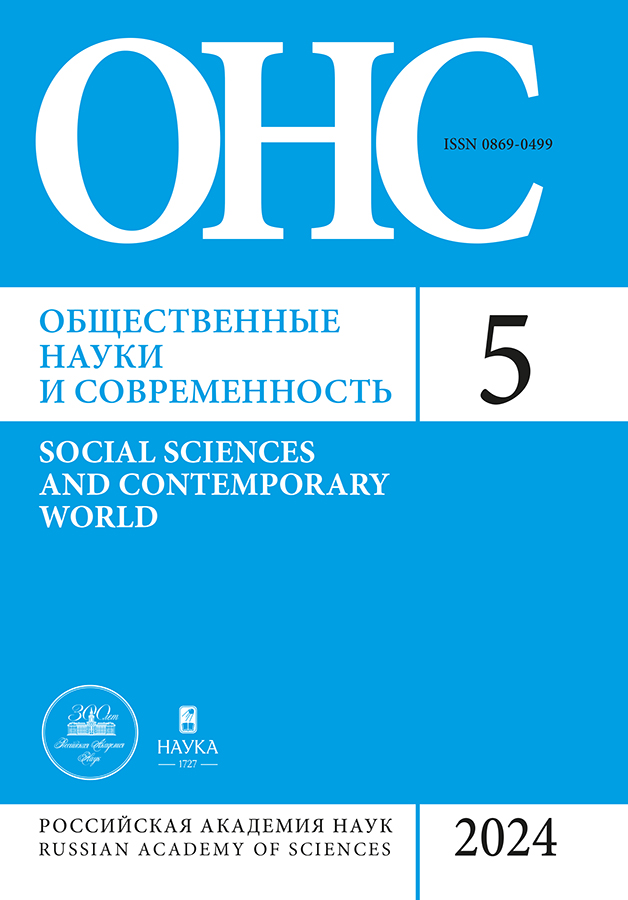Aesthetics of identity and historical themes in screen arts
- Authors: Andreev A.L.1,2, Kuznetsova T.V.3
-
Affiliations:
- Institute of Sociology of the Russian Academy of Sciences
- National Research University of the Moscow Power Engineering Institute
- Lomonosov Moscow State University
- Issue: No 5 (2024)
- Pages: 60-71
- Section: Media studies
- URL: https://ruspoj.com/0869-0499/article/view/686136
- DOI: https://doi.org/10.31857/S0869049924050051
- EDN: https://elibrary.ru/JUTARH
- ID: 686136
Cite item
Abstract
The article is devoted to the role of art in the formation of historical self-awareness as the basis of Russian identity. It is proposed to introduce a new concept into the analytical apparatus of the theory of identity – “aesthetics of identity”, which allows revealing unexplored aspects of identity associated with the emotional and figurative side of social thinking. From this angle, the subject matter of Russian screen production is considered, both its creative achievements and a certain limitation of the thematic range are noted. In particular, it is argued that Russian cinema has done relatively little for the artistic understanding of the era that ended the existence of imperial Russia. The deficit of high-quality screen products that present the viewer with aesthetically meaningful images of Russia during the late empire is associated with the inertia of some ideologically tendentious stereotypes of the Soviet era. Despite the considerable achievements of post-reform and pre-revolutionary Russia, despite the significant aesthetic potential of Russian life of that time, captured in painting and art photography, the modern screen is still in search of an aesthetic key to this important period. The conclusion is substantiated that without a comprehensive mastery of the artistic thinking of the era of the late empire, it is difficult to expect the emergence of aesthetic empathy, necessary for understanding the internal coherence of all Russian history and the formation of a full-fledged sense of unconditional involvement in it.
Keywords
Full Text
About the authors
Andrey L. Andreev
Institute of Sociology of the Russian Academy of Sciences; National Research University of the Moscow Power Engineering Institute
Author for correspondence.
Email: Sympathy_06@mail.ru
ORCID iD: 0000-0003-1692-573X
Doctor of Sciences (Philosophy), Professor, Chief Research Fellow, Institute of Sociology of the Federal Scientific Research Center in Sociology of the Russian Academy of Sciences; Professor, National Research University, Moscow Power Engineering Institute
Russian Federation, Moscow; MoscowTatiana V. Kuznetsova
Lomonosov Moscow State University
Email: 89163805403@mail.ru
ORCID iD: 0000-0001-8062-8495
Doctor of Sciences (Philosophy), Professor, Philosophical Faculty
Russian Federation, Building 4, Lomonosov prospect, 27, Moscow, 119234References
- Андреев А.Л. (2015) Специализация цивилизаций и аттракторы мирового развития // Общественные науки и современность. № 1. С. 139–147. / Andreev A.L. (2015) Specialization of civilizations and attractors of world development. Obschestvennye nauki i sovremennost, no. 1, pp. 139–147.
- Андреев А.Л., Андреев И.А., Слободенюк Е.Д. (2022) Представления россиян о будущем России // Социологические исследования. № 10. C. 49–61. / Andreev A.L., Andreev I.A., Slobodenyuk E.D. (2022) Representations of Russians about the future of Russia. Socis, no. 10, pp. 49–61.
- Зябликов А.В. (2022) Формирование советской идентичности средствами отечественного кинематографа в 1920-е – 50-е гг.: к постановке проблемы // Вестник Костромского государственного университета. Т. 28. № 3. С. 52–62. / Zyablikov A.V. (2022) The formation of Soviet identity by means of domestic cinema in the 1920s – 50s: towards the formulation of the problem. Vestnik Kostromskogo Gosudarstvennogo Universiteta, vol. 28, no. 3, pp. 52–62.
- Историческое сознание россиян: оценки прошлого, память, символы (2022). М.: Весь мир. 248 с. / Istoricheskoe soznanie rossiyan: ocenki proshlogo, pamyat’, simvoly [The historical consciousness of Russians: assessments of the past, memory, symbols] (2022). M.: Ves mir. 248 p.
- Карамзин Н.М. (1984) Письма русского путешественника. Л.: Наука. 718 с. / Karamzin N.M. (1984) Pis’ma russkogo puteshestvennika [Letters of a Russian traveler]. Leningrad: Nauka. 718 p .
- Переписка Анджея Валицкого и М.А. Маслина (2022) // Историко-философский альманах. Вып. 7. М.: Изд. Воробьёв А.В. С. 159–200. / Perepiska Andzheya Valickogo i M.A. Maslina [Correspondence of Andrzej Walicki and M.A. Maslin] (2022). In: Historical and philosophical Almanah. Is. 7. Moscow: Ed. Vorobyov A.V. Pp. 159–200.
- Флигстин Н., Макадам Д. (2022) Теория полей. М.: Изд. дом Высшей школы экономики. 462 с. / Fligstin N., Makadam D. (2022) Teoria poley [Theory of fields]. Moscow: Vysshaya Shkola ekonomiki. 462 p.
- Хантингтон С. (1994) Столкновение цивилизаций? // Полис. Политические исследования. № 1. С. 33–48. / Huntington S. (1994) Clash of Civilizations? Polis, no. 1, pp. 33–48.
- Цыркун С. (2009) «Очень приятно, царь». «Иван Грозный», режиссёр Андрей А. Эшпай // Искусство кино. № 5. (https://old.kinoart.ru/archive/2009/05/n5-article9). / Tsyrkun S. (2009) “Very nice, tsar”. “Ivan the Terrible”, directed by Andrey A. Eshpai. Iskusstvo kino, no. 5. (https://old.kinoart.ru/archive/2009/05/n5-article9).
- The Transformation of Higher Learning. 1860–1930 (1982) / Ed. by K. Jarausch. Stuttgart: Klett-Cotta. 375 р.
Supplementary files










